By now, it’s safe to say that 2017’s revival of Twin Peaks turned out to be nothing like what anyone thought it was going to be. It was still unmistakably Twin Peaks, while at the same time feeling far darker, expansive, and uglier than anything we had previously seen in the show.
Among the more divisive elements of the revival: the town of Twin Peaks itself. Visits to the town felt relatively few and far between, and when we did check in with the town’s residents there was seemingly very little of the warmth most of us remembered from the show’s original run. But on further examination, one discovers that this new tone brings it more in line with one of the key ideas that repeatedly shows up in Lynch’s work: caution against nostalgia.
See, the Twin Peaks revival came about when the golden age of TV revivals, spearheaded by streaming services such as Netflix, was truly starting to kick into high gear, and our visits to the town of Twin Peaks feel like a direct response to this revival era. The inherent problem—and the inevitable underlying sadness—with the TV revival series is that sense of nostalgia that creators try to exploit. They try to recreate what we loved about the original run of a series, leading to characters not being allowed to grow or in some cases having growth they’ve previously experienced reversed.
For instance, the finale of Will and Grace saw the two leads have a falling out before going their separate ways, growing as people, and eventually reconciling years later. When the series was revived in 2017, the entire episode was revealed to be a dream by one of the characters, and that Will and Grace are both divorced and back to living together once again. Time moves forward, and nothing changes.
Lynch is no stranger to using imagery and themes that call back to the ’50s he grew up in. But each time that imagery shows up in one of his films it’s directly paired with darkness and terror, suggesting that these negative elements have always been present beneath these seemingly idealized eras in our history, and undercutting the nostalgic lens with which we look back on these time periods. But what Lynch accomplishes with The Return goes even further than before: here, he repeatedly exploits the nostalgia people feel for the original series, portraying it as either empty and unfulfilling or as an outright negative force bringing unseen—but no less tangible—harm to the residents of our beloved town.
Symbols of Peaks nostalgia are used sparingly in The Return, in ways that often wind up feeling unfulfilling and leave us with a sense of disappointment. A cup of coffee or a slice of cherry pie feels like something that will bring Agent Cooper back to us, but each time it fails and we’re left with him trapped in his near-catatonic state. Audrey’s dance gets recreated, but in a way that leads to a moment of terror rather than satisfaction.
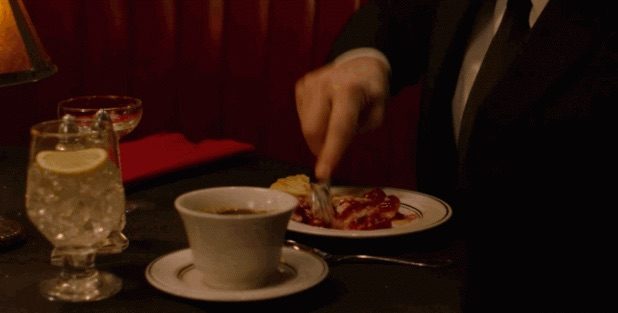
Without the comfort these symbols provide to us, we’re left with something that feels much darker than the original run, but even then it’s not entirely accurate to call this sense of darkness new. By its very nature, nostalgia is a falsehood, distorting our memories of something from the past by amplifying the aspects we love and glossing over less favorable elements. What gets lost in the coffee, pie and Red Room aesthetic elements of the love people have for Twin Peaks is the fact that it was a dark show, one about a town being terrorized by entities from another dimension and a girl who was raped and murdered by her own father. In this aspect, the dark and unsettling feel of The Return is likely closer to Lynch and Frost’s original vision for the series, one that tends to be forgotten in favor of more comforting elements.
But nowhere is nostalgia more heavily used against us than in the town of Twin Peaks itself. In our seemingly few and far between visits to characters we know and love, we find that most of them seem trapped in a negative part of life, or in storylines that feel reminiscent of the ones they went through in the original series. The most straightforward sense of this comes from a place we might not necessarily expect: Shelly Johnson, now Shelly Briggs. When we first met her in the original Peaks, her storyline and character was one straight out of one of the soap operas: young, beautiful, having a dangerous, thrilling, secret romance with a bad boy type while working at the RR.
When we see her again in The Return, her story is…roughly the same as it was before. Still working at the RR, and once again having left a husband for a new and exciting bad boy type. But now, she’s a grown woman with a daughter, and instead of sneaking out behind the back of known scumbag Leo Johnson, this time around the husband she’s left is none other than Bobby Briggs, someone else we know and love. Instead of embracing personal growth, Shelly seems to be running from it, subconsciously trying to recreate her past at the expense of her relationship with Bobby and her responsibilities as a grown woman and a mother. We even get a storyline about her daughter, Becky, that feels reminiscent of Shelly’s arc in the original series, but stripped of the soap opera-esque glamor and mystique. Both times, the message is the same: what was once thrilling and exciting, is now unsatisfying and almost sad.
This trend continues with other citizens of Twin Peaks that we check back in with: Ed, Nadine, and Norma are still stuck in their love triangle (at least, when we first see them); James is back in Twin Peaks, still sweet, still dumb, still chasing after women he probably shouldn’t (at the very least, he’s still cool); Andy and Lucy are still their lovable, loopy selves, but in a way that now inhibits their ability to function in the modern world.
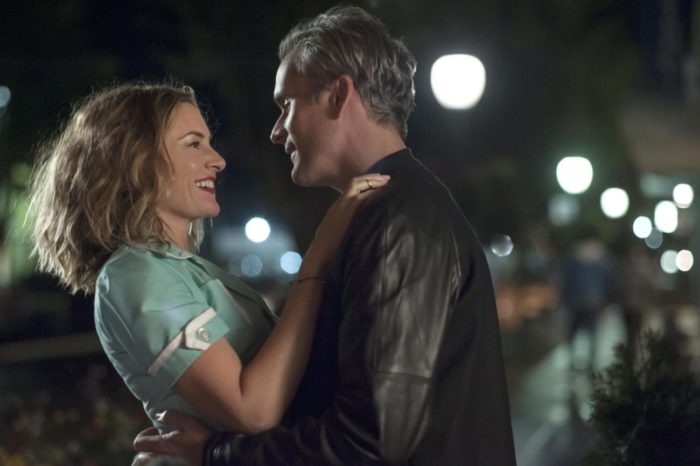
There’s an almost ironic sense with which these characters are presented to us, as if Lynch and Frost aim to say, “Isn’t this what you wanted? To see these people again just as you remembered them?” Whereas other TV revivals steer clear of this question, Peaks fully embraces what it would actually be like to see characters basically trapped as they were when we first saw them, and the conflicting nature present in any revival or reboot: that on some level, we do want to see beloved characters just as we remember them, but we also don’t want to see them stuck in the same place that we left them when the original series ended. We want these characters to have had a happy ending, and at the same time we want their stories to continue beyond that end.
Revivals like Will and Grace and Fuller House might have captured the dynamic of the original series, but do we really want to see that the lives of these people have played out in a way that they wind up in similar circumstances to where we left them off? Some reboots and revivals have addressed these sorts of questions, but Peaks is the only one I’ve seen that went out of its way to actively make it a source of discomfort and sadness in a way that feels essential to what Lynch and Frost want to tell us, not just about Peaks and TV revivals, but about life.
But, Peaks also gives us a counterpoint to these characters trapped by nostalgia, and it winds up being the best character arc of the original Peaks characters: Bobby Briggs. In direct contrast to the nostalgic trappings of other characters in the town of Twin Peaks, Bobby’s arc is one of growth, one of completion, or perhaps a more appropriate word would be fulfillment—both for him as a person and for the future Major Briggs saw for him in one of the original run’s most moving moments. He’s still unmistakably the Bobby we know and love, but he’s a Bobby who has grown up and become who he’s meant to be.
When we first get reunited with Bobby in Part 4 of The Return, it’s a simple yet shocking moment. Sheriff Truman, walking through the Sheriff’s Station, calls out “Bobby!” to a silver-haired figure down the hallway. He turns, and there he is: Bobby Briggs, in full uniform, now a deputy of the Twin Peaks Sheriff’s Department. The two have a brief exchange regarding an overdose in town, with Bobby—as if to emphasize just how much he’s come full circle—now monitoring the trails into Canada to try and keep the drug trade out of Twin Peaks where he once was bringing them into town as a young man—after all, as a certain special agent tells us, the past dictates the future.
Then, when we return to the conference room, we get what is—to me at least—one of the most important scenes to understanding Lynch’s stance on nostalgia, especially as it relates to Twin Peaks. Having recently reopened the case involving Laura Palmer and Dale Cooper, Hawk, Andy, and Lucy have laid out all the evidence they have that’s relevant to the case—including the now-famous photo of Laura when she was crowned homecoming queen.
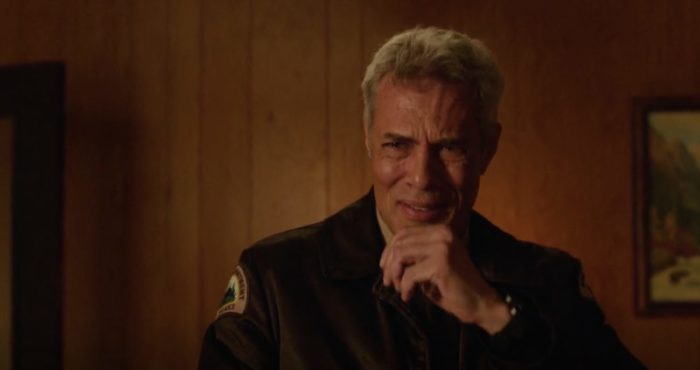
When Bobby walks in and sees the photograph, Lynch and Frost dial up the Peaks nostalgia to full blast: Laura’s photograph is bathed in the warm, almost woodsy feeling light and color that the original run was known for, and for the first time in The Return (minus the opening credits) we get a piece of Angelo Badalamenti’s iconic score, as we’re seemingly enveloped by “Laura Palmer’s Theme.”
This is all undercut by Bobby, who breaks into tears almost immediately upon seeing Laura’s photograph. “Man…brings back some memories…” he says, trying to choke back sobs, and that line speaks true for both him and us in the audience. It does indeed bring back some memories for all, but the memories they bring back are likely completely different depending on what your perspective is on the events of the original series. That photograph and that theme bring back what are, for us, likely fond memories; of watching the original show week to week, seeing how things played out, indulging in an escape to a place that was truly both wonderful and strange.
Bobby’s memories of that time, on the other hand, are decidedly less warm and fuzzy. They’re memories of the time when his girlfriend died and he was briefly accused of her murder. They’re memories of a time when people he knew were trapped in conflict, whether with themselves, with each other, or with things they couldn’t begin to comprehend. That’s not to say our memories of the show are any less authentic or valid, but they’re ones that often gloss over the darkness that was always there, whether in The Return or in the original series.
But, Bobby isn’t overwhelmed by the pain he remembers, nor does he try to hide from what he feels or do what we might want to do and try to escape into fonder memories of that time. Instead, he’s able to pull through, collect himself, and give us the first of several key clues to the mystery surrounding Cooper’s disappearance: that Cooper was the last person to see his father alive, and left town shortly before the Major died.
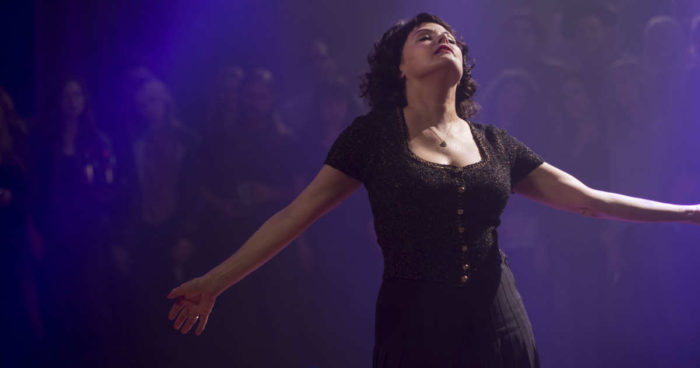
Because Bobby has been able to grow as a person, his role in The Return is fundamentally different from his role in the original series: instead of being part of one of the outlying storylines that spiraled out from Laura Palmer’s murder, he’s playing a key role in the town’s central mystery and storyline. His role here even has direct parallels to another member of the Sheriff’s Department: Hawk. Both receive messages that they alone can understand, ones that are directly linked to their heritage—Bobby’s personal heritage as the Major’s son, and Hawk’s Native American heritage. But each of them comes from a different point in time: Bobby’s messages come from the past, left long ago by the Major, while Hawk’s come from the present, via his phone calls with Margaret and her log.
We don’t get the full picture of Bobby’s journey—at least, not in the show. But the before and after that we get of Bobby from the original show versus Bobby from The Return gives us the most complete portrait of someone who’s walked that difficult path of personal growth, one that often takes us through inner darkness, and has come out the other side as a more complete person. A person who fully embraces his new role as town guardian, both the day-to-day work of a deputy and the more bizarre task of following the Major’s clues from the past.
Finally, Twin Peaks—like all of Lynch’s work—has always been on some level about the medium that it occupies, in a way that seeks to blur the lines between show and viewer. One of the most iconic shots of the original series was that of BOB crawling over the Palmer’s furniture towards the screen, in a way that felt like he was about to crawl out of the screen to get at us, the viewers. Throughout The Return, we hear of “Judy,” described by Gordon Cole in Part 17 as an “extreme negative force.”
I don’t know if this was Lynch’s intention or not, but the way in which nostalgia is presented in The Return makes me wonder if we are meant to be part of that negative force, if our nostalgia for the original series is having a tangible, negative impact on the lives of those living in Twin Peaks. Times change, people change, what’s exciting and almost magical for someone in their late teens would be depressing to see in someone in their late 30s.
We’re meant to grow, to change, to shovel ourselves out of the sh*t—or as Deputy Director Cole so eloquently put it, to fix our hearts or die—and our nostalgic longing to see these characters again just as they were twenty-five years ago is one that would rob them of the chance to do any of that. We can no more go back to the way things once were, any more than Agent Cooper can change Laura Palmer’s fate.
Instead, we’re meant to embrace change, to grow, and it’s no accident that the most satisfying character moments in The Return are the ones of growth or where someone breaks out of their loop to become a better version of themselves. When Nadine finally takes that step forward, acknowledging that Ed has been unhappy all these years and telling him to go after Norma, it leads to a moment of borderline rapturous joy when Ed and Norma finally get that long-awaited happy ending. Time and time again, Lynch’s films have cautioned us against being overly nostalgic, to avoid letting our feelings and fondness for something distort our memories of it, and to avoid trying to recreate something from our past or recapture feelings from long ago. Perhaps, at long last, we might finally heed that warning.


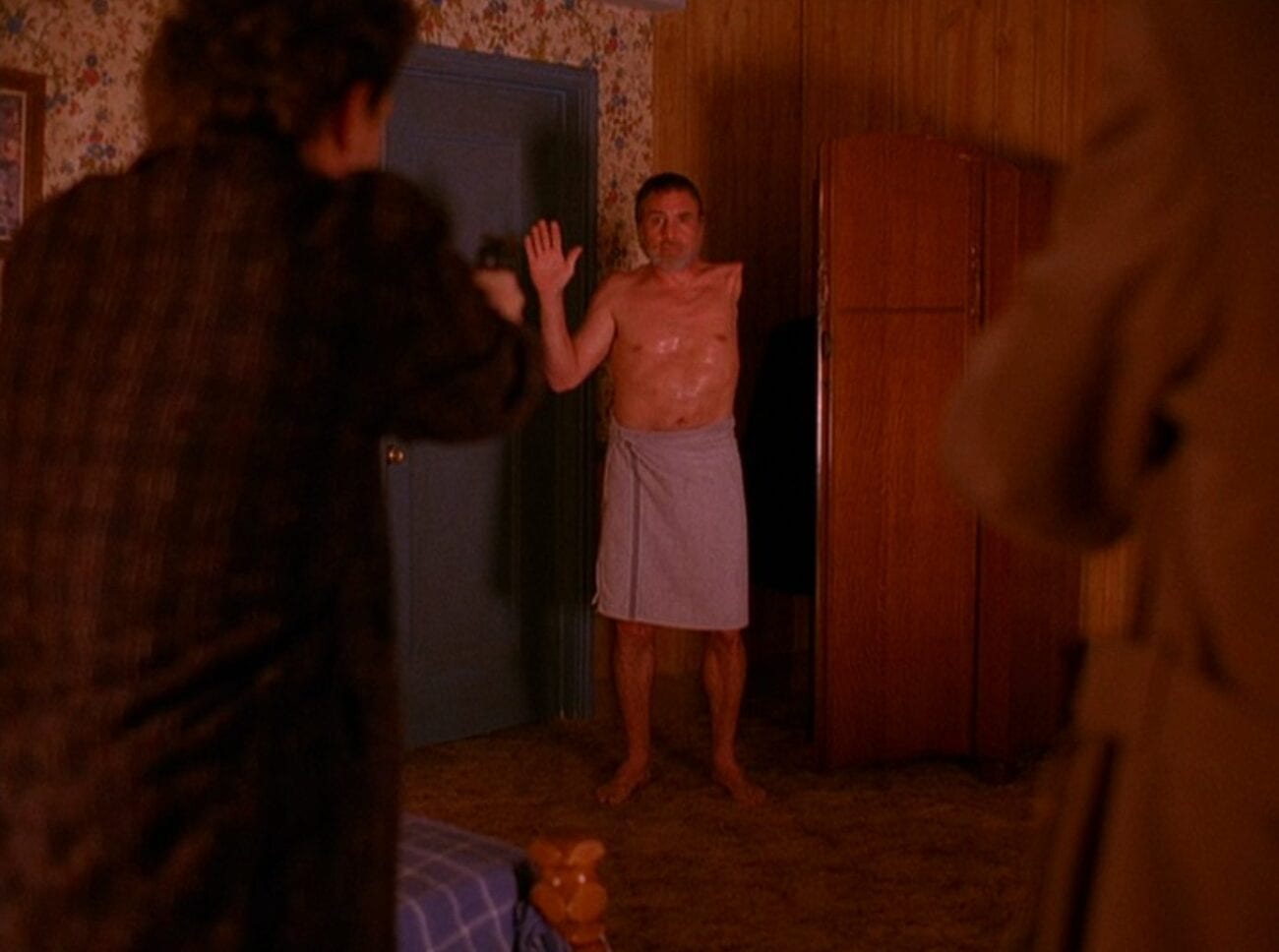
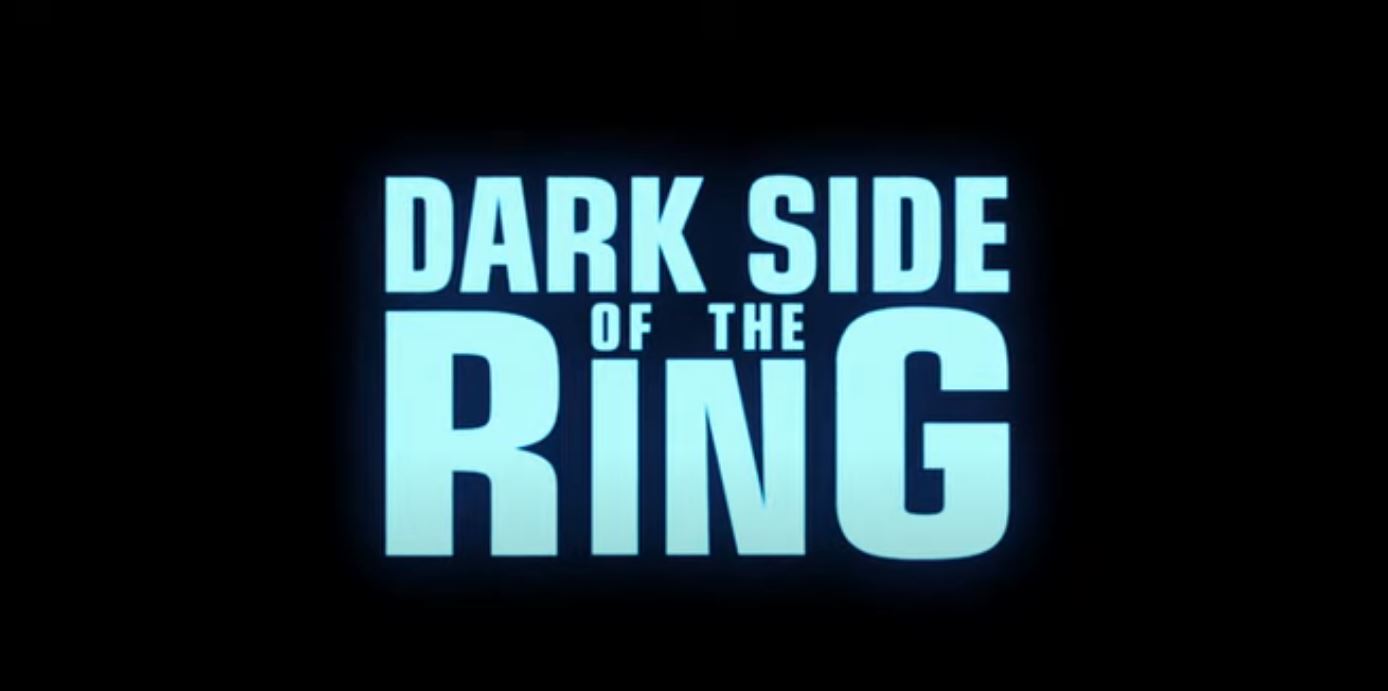


Twin Perfect has a similiar theory in this 4½ (!) hour analysis of Twin Peaks.
https://www.youtube.com/watch?v=7AYnF5hOhuM&t=19s
According to Twin Perfect, the whole series is an analogy about the audience’s want for lightweight entertainment about murder and death — an extremely negative force. This is what we *want* but not what we *need*.
I don’t agree with everything Twin Perfect says, especially the blown-up claim that this is the sole true meaning of Twin Peaks, as intended by the author (i.e. Lynch). But it is an impressive well-rounded theory that is worth watching, and to me as a Twin Peaks fan almost as entertaining as watching the show itself.
Yeah, I’d certainly be suspicious of anything that someone claimed to be the sole true meaning of Twin Peaks, or really any of Lynch’s work. I think part of the reason he’s never explicit about the meaning behind any of his work is because he wants his films left open to interpretation and discussion, especially when somebody can look at something in entirely a different way based on who they are and what their perspective is based on their life and experiences
I don’t like to see nostalgia demonised. Sometimes nostalgia is all I have to keep me going. But I agree that season three of “Twin Peaks” refuses to be a nostalgic pleasure, and instead accurately reflects the cruelty of the passage of time. The years have not been kind to most of the characters, nor to us in the audience. The real world has changed for the better in a lot of ways, but 1989 was a simpler, more innocent time. Life is scary and depressing, and unfortunately, “Twin Peaks” reflects that.
I’m still glad season three exists. It was a worthwhile and enjoyable experience. I’m also going to hang on to my nostalgia.